外研版英语八年级上册Module 5单元知识点归纳总结(详细版)
外研社 八年级上册 Module 5 知识点
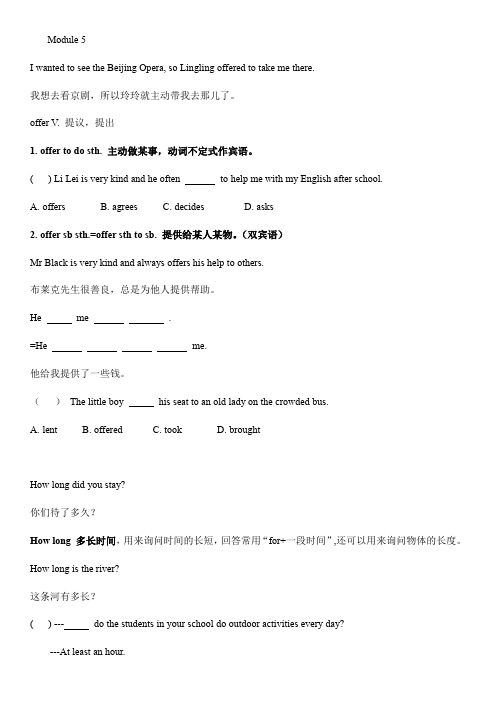
Module 5I wanted to see the Beijing Opera, so Lingling offered to take me there.我想去看京剧,所以玲玲就主动带我去那儿了。
offer V. 提议,提出1.offer to do sth. 主动做某事,动词不定式作宾语。
( ) Li Lei is very kind and he often to help me with my English after school.A.offersB. agreesC. decidesD. asks2.offer sb sth.=offer sth to sb. 提供给某人某物。
(双宾语)Mr Black is very kind and always offers his help to others.布莱克先生很善良,总是为他人提供帮助。
He me .=He me.他给我提供了一些钱。
()The little boy his seat to an old lady on the crowded bus.A.lentB. offeredC. tookD. broughtHow long did you stay?你们待了多久?How long 多长时间,用来询问时间的长短,回答常用“for+一段时间”,还可以用来询问物体的长度。
How long is the river?这条河有多长?( ) --- do the students in your school do outdoor activities every day?---At least an hour.A.How oftenB. How longC. How muchD. How farWell, it was interesting--that’s the main thing.嗯,它很有趣---那才是主要的事。
main adj.主要的mainly adv. 主要地mainly 是main 的副词形式,相当于mostly ,没有比较级和最高级形式。
(完整)外研版八年级英语上册Module5知识点总结,推荐文档

外研版八年级上册Module 5 知识点归纳一.短语强记drink tea 喝茶,in the end最后,main thing主要的事情,next time下次,no idea 不知道,be famous for因……而闻名,would like想要,one of… ……之一,common people普通人,the end of the nineteenth century 19世纪末,send…to 把……送到……,return to回到……,be named被命名为,the People’s Art ist人民艺术家,magic shows魔术表演,give a warm welcome to 热烈欢迎……,take place 发生,think about考虑,at the end of 在……末尾,have a great time过得愉快,at the same time同时二.知识点解析1. actress n. 女演员actor n.男演员2.want to do sth是主语某人自己想要做某事;want sb to do sth是主语某人想要让另外一人做某事want to______the Beijing Opera想去看京剧3.offer① offer sth. 主动提供某物,offer_____ ______提供一些建议② offer sb. sth.=offer sth. to sb. 给某人提供某物,offer a good job___him给他提供一份好工作③ offer to do sth. 主动提出做某事,offer ___ ____ me主动帮助我4.hope to do sth.希望做某事5.agree to do sth.同意做某事6.take…to…带某人或某物去某地,后接地点副词,to可以省略。
take me there7.in the end 最后,终于,相当于finally或at lastat the end of …在…的末尾,在…的尽头, at the _____ of the road8.No idea=I have no idea./ I don’t know.9.be famous for 因……闻名,Lao She is famous ______his play teahouse.be famous as 作为……而闻名, Lao She is famous ______a great writer.10.show①“展示;显示;给……看” show sb. sth.或show sth. to sb.给某人看或者展示某物,show me a book= show a book____me,注意:“show it(them) to sb.”结构。
外研版八年级英语上册Module 5单元知识点归纳

外研版八年级英语上册Module 5 Lao She TeahouseI wanted to see the Beijing Opera.必背单词1.actress(n.)女演员→actor(n.)男演员2.offer(v.)提议,提出→offer to do sth. 主动提出干某事3.teahouse(n.)茶馆4.end(n.)(时间的)最后一段,末尾;(v.)结束必背短语5.no idea 不知道6.drink tea 喝茶必背句子7.Lingling offered to take me there.玲玲主动提出带我去那儿。
8.It was difficult to understand the words.台词很难理解。
9.We only planned to watch for an hour,but in the end,we stayed for three hours.我们原计划只看一个小时,但最后我们呆了三个小时。
10.I hope to understand more next time.下次我希望能听懂更多。
11.He's especially famous for his play Teahouse.他尤其因为他的话剧《茶馆》而出名。
It describes the changes in Chinese society.必背单词1.show(v.)展示;显示→showed(过去式)2.twentieth(num.)第二十→twenty(基数词)二十3.describe(v.)描写;描述→description(n.)描述4.society(n.)社会→societies(pl.)5.act n.(戏剧、歌剧或芭蕾舞的)一幕6.common(adj.)普遍的;一般的7.college(n.)大学;学院8.novel(n.)(长篇)小说9.name(v.)给……取名;给……命名10.if(conj.)如果;若11.magic(adj.)魔术的;戏法的必背短语12.head teacher 校长13.the end of the nineteenth century十九世纪末14.be born 出生15.all over the world全世界必背句子16.Teahouse is one of Lao She's most famous plays.《茶馆》是老舍最著名的戏剧之一。
初二英语上册(外研版)Module_5_Lao_She_Teahouse_知识点总结
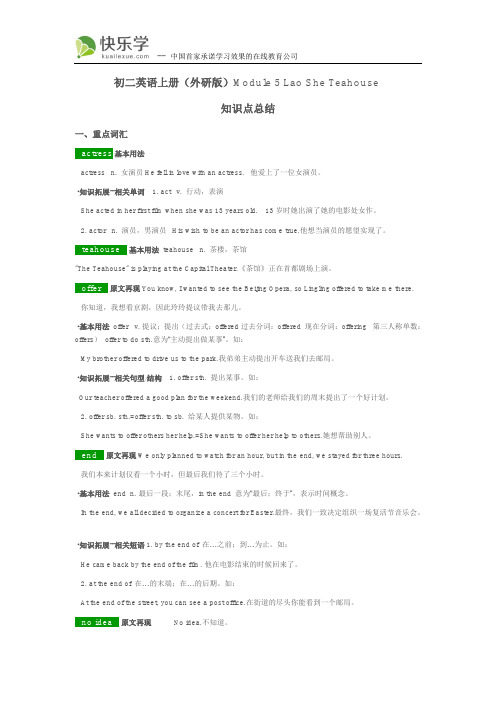
初二英语上册(外研版)Module 5 Lao She Teahouse知识点总结一、重点词汇actress基本用法actress n. 女演员He fell in love with an actress. 他爱上了一位女演员。
·知识拓展--相关单词 1. act v. 行动,表演She acted in her first film when she was 13 years old. 13岁时她出演了她的电影处女作。
2. actor n. 演员,男演员 His wish to be an actor has come true.他想当演员的愿望实现了。
teahouse 基本用法teahouse n. 茶楼,茶馆"The Teahouse" is playing at the Capital Theater.《茶馆》正在首都剧场上演。
offer 原文再现You know, I wanted to see the Beijing Opera, so Lingling offered to take me there.你知道,我想看京剧,因此玲玲提议带我去那儿。
·基本用法offer v. 提议;提出(过去式:offered 过去分词:offered 现在分词:offering 第三人称单数:offers)offer to do sth.意为“主动提出做某事”。
如:My brother offered to drive us to the park.我弟弟主动提出开车送我们去邮局。
·知识拓展--相关句型/结构 1. offer sth. 提出某事。
如:Our teacher offered a good plan for the weekend.我们的老师给我们的周末提出了一个好计划。
2. offer sb. sth.=offer sth. to sb. 给某人提供某物。
外研版英语八年级上册Module-5知识点及练习题(含答案)

外研版英语八年级上册Module5 Lao She Teahouse 知识点课文知识点1. — Who is Lao She? 老舍是谁?— No idea. 不知道。
这里的No idea 相当于I don’t know。
例如: She has no idea where to go. 她不知道要去哪里。
— Do you know how old our teacher is? — I have no idea. She looks pretty young.2.You know, I wanted to see the Beijing Opera, so Lingling offered to take me there. 你知道,我想看京剧,所以玲玲提议带我去那里。
offer的用法:(1) offer作动词,表示主动提出做某事,后接不定式,至于对方接受或采纳与否不予说明。
如:He offered to lend me his dictionary.他主动要把他的词典借给我。
(2) offer作动词,表示主动提出给与某人某物时,后面可接双宾语。
如:The headmaster offered me her raincoat.校长要把她的雨衣借给我。
(3) offer作动词,还可以表示出价。
They offered him 3,000 yuan for the motorbike.他们提出以3000元的价格买他那辆摩托车。
(4) offer用作名词,意为提议;提供;出价。
如:Thank you for your offer of help.感谢你主动帮忙。
3. My parents agree to on Saturday.我父母同意在周六。
agree的用法小结(1)agree with①表示同意某人或某人的意见、想法、分析、解释等(即持同一观点)。
如:I quite agree with you.我完全同意你的意见。
Module 5 外研版英语八年级上册知识点背诵

Module 5◆重点词汇1.actress n.女演员actor n.男演员2.teahouse n.(尤指亚洲的)茶馆3.offer v.提议;提出offer to do sth.主动提出做某事offer sb.sth.=offer sth.to sb.给某人提供某物4.end n.(时间的)最后一段,末尾v.结束in the end=at last=finally最后;终于at the end of...在……的末端;在……的后期(即可指时间,也可指空间) by the end of...在……之前;到……为止(只表示时间概念)5.act n.(戏剧、歌剧或芭蕾舞的)一幕v.表演6.show v.展示;显示n.演出;表演mon adj.普通的;一般的lives of common people普通人的生活8.twentieth num.第二十the middle of the twentieth century 20世纪中叶9.describe v.描写;描述description n.描述,描写a description of ……的描述10.society n.社会social adj.社会的the changes in Chinese society中国社会的变迁11.college n.大学;学院12.novel n.(长篇)小说 v.给……取名,给……命名be named/called被称为……14.if conj.如果;若15.magic adj.魔术的;戏法的magic shows魔术表演16.main thing重要的事17.no idea不知道18.head teacher 校长19.the People’s Artist人民艺术家20.give a warm welcome to sb.热烈欢迎某人21.all over the world全世界◆重点句型1.You know,I wanted to see the Beijing Opera,so Lingling offered to take me there.你知道的,我想看京剧,因此玲玲主动提出带我去那儿。
外研版八年级英语上册Module 5 知识汇总

外研版八年级英语上册Module 5 知识汇总Module 5 知识梳理【重点短语】1.send/give sb. sth.=send sth. to sb. 发送/给某人某物2.every/each(每个)+V单数3.tired 累的(人)tiring 累的(物、事)4.think of 认为think about 考虑5.take sth. out of 拿出take away 拿走带走take off 飞机起飞、脱衣服6.get up 起床make sb. do sth. 使某人做某事7.on one’s way to …在某人去……的路上8.in the end = at last=finnally 最后、最终9.take sb. to sw. 到某人到某地10.No idea. =I have no idea.= I don’t know.不知道11. one of + 可数名词复数…...之一one of + 最高级+可数名词复数最….之一13.in the nineteenth\twentieth century 在十九/二十世纪14.after finishing school 毕业后15.be named\called 被称为……16.magic show 魔术表演17.traditional music\food\festival 传统音乐\食物\节日18.give a warm welcome to sb. 热烈欢迎(某人)19.all over the world 全世界20.happen= take place 发生return to 回到21.Who is it by? 由…..创作?at a college 在大学22.offer to do sth. 主动提出去做某事23.agree to do sth. 同意去做某事agree with sb. 同意某人24.plan 计划/decide 决定/hope希望/want想要/agree同意/offer建议/try尝试/wish/希望/begin开始/need需要/forget忘记+ to do sth.(动词不定式短语作宾语)24. be glad/happy to do sth. 高兴做某事25. buy sb. sth.=buy sth. for sb. 为某人买某物【重点句子】1. I want to see the Beijing Opera. 我想去看京剧。
(外研版)初中英语八年级上册知识点归纳总结
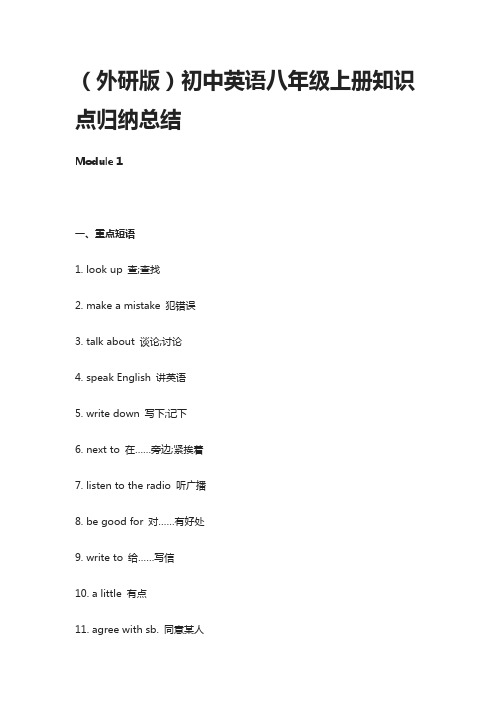
(外研版)初中英语八年级上册知识点归纳总结Module 1一、重点短语1. look up 查;查找2. make a mistake 犯错误3. talk about 谈论;讨论4. speak English 讲英语5. write down 写下;记下6. next to 在……旁边;紧挨着7. listen to the radio 听广播8. be good for 对……有好处9. write to 给……写信10. a little 有点11. agree with sb. 同意某人12. talk to 跟……交谈13. send sth. to sb. 把某物(发)送给某人14. ask for 请求15. watch films 看电影16. be from 来自17. smile at 冲……微笑18. go to bed 去睡觉19. get up 起床20. think about 考虑21. make friends with sb. 与某人交朋友22. take sb. around sp. 带领某人参观某地23. a few 几个;一些24. invite sb. to 邀请某人到……25. be good at 擅长26. for example 例如二、重点句型1. advise sb to do sth 建议某人做某事2. be afraid to... 害怕做……3. be good for... 对……有好处的4. be (a) great way(s) to do sth 做……的(一种)好方法5. It is natural to do sth. 做某事是合乎常情的。
三、重点语法1. Why not...? = Why don’t + you (we / they...)...?意为“为什么不……呢?”,后接动词原形。
eg:Why not / Why don’t we help the old cleantheir rooms this afternoon?今天下午为什么不去帮助老人打扫房间呢?2. What / How about...? 意为“……怎么样?”,其中about 是介词,后接名词或动词-ing 形式。
外研版英语八年级上册module5重点短语归纳复习

外研版英语八年级上册module5重点短语归纳复习外研版英语八年级上册【Module 5 Lao She Teahouse【模块5 老舍茶馆】Unit 1 I wanted to see the Beijing Opera【第1单元我想看京剧】【1】Lao She Teahouse 【老舍茶馆】【2】module task 【模块任务】【3】act out a scene from a play 【将一个剧本中一个场面表演出来】【3】see the Beijing Opera【看京剧】【4】work in pairs 【结对练习】【5】look at the pictures 【看这些照片】【6】talk about the pictures 【谈论这些照片】【7】use the word in the box to help you 【使用方框里的单词去帮助你】【8】underline the correct words or expressions 【在正确单词或者短语下划线】【9】the traditional Beijing Opera 【传统的京剧】【10】sth be easy to understand 【某事很容易理解】【11】sth be difficult to understand 【某事很难理解】【12】go to Lao She Teahouse 【去老舍茶馆】【13】How was it ? 【它怎么样?】【14】It was great 【它非常好】【15】I want to see the Beijign Opera 【我想看京剧】【16】Sb offers to take me there 【某人主动提出带我去那里】【17】drink tea and watch an opera 【喝茶看戏】【18】Did you understand the opera? 【你理解戏剧吗?】【19】It was difficult to understand the words 【要理解戏剧语言是很难的】【20】The actors and actresses were excellent 【男女演员都非常出色】【21】How long did you stay? 【你们停留了多久?】【22】we only planned to watch for an hour 【我们原本计划仅看一个小时】【23】in the end 【最后】【24】we stayed for three hours 【我们却待了3小时】【25】Did you enjoy it ? 【你喜欢它吗?】【26】That’s the main thing 【那是主要的事情】【27】I hope to understand more next time 【我希望下一次能理解更多东西】【28】Do you often go to see the Beijing Opera? 【你经常看京剧吗?】【29】go to see Beijing Opera 【去看京剧】【30】I wanted to take Betty to the teahouse 【我想带贝蒂去茶馆】【31】Who is Lao She ? 【老舍是谁呢?】【32】Lao She is a great writer 【老舍是一位伟大的作家】【33】He is especially famous for his play Teahouse 【他尤其以他的话剧“茶馆”而著名】【34】complete the passage 【完成这篇短文】【35】with the correct form of the words in the box 【用方框中单词正确形式】【36】be famous for 【以….而闻名】【37】Everyday English【日常英语】【38】(I have )no idea=I don’t know 【我不知道】【第二单元:它描写了中国社会的一些变化】【1】the changes in Chinese society 【中国社会的变化】【2】ask and answer the questions about Lao She 【提问并回答关于老舍的问题】【3】What do you know about Lao She? 【关于老舍,你知道什?】【4】What are his most books and plays 【他的最著名的书和戏剧是什么?】【5】his most books and plays 【他的最著名的书和戏剧】【6】What is special about Lao She’s Teahouse? 【关于老舍中的“茶馆”中特别之处是什么】【7】read the pasage 【阅读这边短文】【8】match the headings with the paragraphs 【将段落与标题进行匹配】【9】Lao She Teahouse 【老舍茶馆】【10】The story of Teahouse 【茶馆的故事】【11】Teahouse 【茶馆】【12】one of Lao She’s most famous plays 【老师最著名戏剧之一】【13】in 1957 【在1957年】【14】The play has three acts 【该戏剧有三幕】【15】show the lives of common people in China 【展示了中国普通民众的生活】【16】from the end of the nineteenth century to the middle of the twentieth century【从20世纪末到20世纪中期】【17】It tell us the story of Wang Lifa and the customers【它向我们讲述了王利发和顾客们的故事】【18】the story of Wang Lifa and the customers of his teahouse in Beijing【生活在北京王利发和他的茶馆中中的故事】【19】his teahouse in Beijing 【他在北京的茶馆】【20】It describes the changes 【她描述这些变化】【21】in Chinese society 【在中国社会】【22】over fifty years 【在50多年里】【23】Lao She was born in Beijing in 1985【老舍于1989年出生在北京】【24】His mother sent him to a teacher’s school 【他的母亲把他送到一所师范学校】【25】send sb to a teacher’s school 【送某人到一所师范学校】【26】after finishing school in 1918 【在1918年毕业之后】【27】He became a head teacher of a primary school 【他成为了一所学校的校长】【28】in 1924 【在1924年】【29】Lao She left home and went to England 【老舍离开家去了英国】【30】He taught Chinese a a college in London and returned to China five years later【他在伦敦一所大学里教授汉语并于5年之后回到了中国】【31】many plays , novels and short stories about people’s lives【许多关于人民生活的戏剧,小说以及短篇小说】【32】He was named “the People’s Artist.,”【他被称之为人民艺术家】【33】Lao She is one of the greatest Chinese writers of the twentieth century【老舍是二十世纪中国最伟大的作家之一】【34】one of the greatest Chinese writers of twentieth century【二十世纪中国最伟大的作家之一】【35】one of the greatest Chinese writers【最伟大的作家之一】【36】at Lao She T eahouse today 【在今天的老舍茶馆里】【37】Customers can drink tea and eat delicious Beijing food 【顾客能喝茶并吃到美味北京食物/小吃】【38】If you like the Beijing Opera, traditional music ormagic shows, you can enjoy them at the teahouse 【如果你喜欢京剧,传统音乐或者魔术表演,你都可以在茶馆里欣赏到他们】【39】Lao She Teahouse gives a warm welcome to everyone from all over the world【老舍茶馆热情欢迎来自世界上的每一个人】【40】give a warm welcome to everyone 【热烈地欢迎每个人】【41】from all over the world 【来自世界上的/来自世界各地的】【42】the changes to the lives of common people in Chiense society【中国社会的普通人们生活变化】【43】in the first half of the twentieth century 【二十世纪上半叶】【44】write sentences about Teahouse 【写关于茶馆的句子】【45】write a passage about your favourite play or film【关于你最喜欢戏剧或者电影写一篇短文】【第三单元:老舍茶馆:语言运用】【1】language in use 【运用中的语言】【2】language practice 【语言练习】【3】I wanted to see the Beijing Opera 【我想看京剧】【4】Lingling offered to take me there 【玲玲主动提出来带我去那里】【5】We only planned to watch for an hour 【我们计划仅看一个小时】【6】I hope to understand more next time 【我希望下次理解更多点】【7】We decided to stay at home 【我们决定呆在家里】【8】Lao She started to teach Chinese in London 【老舍开始在伦敦教授汉语】【9】They plan to see a film tomorrow 【他们计划明天看一场电影】【10】I want to spend my holiday in Beijing【我想在北京度过我的假期】【11】I tried to write poems 【我努力地写诗】【12】I would love to see the Beijing Opera again 【我想再次去看京剧】【13】Would you like me to take you ? 【你想要我带你去吗?】【14】go to Mei Lanfang Theatre 【去梅兰芳剧院】【15】Good idea 【好主意】【16】Let’s go next Saturday 【让我们下个星期六去】【17】Lingling advised them to go to Mei Lanfang Theatre 【玲玲建议他们去梅兰芳剧院】【18】Lu Xun is one of the greatest writers of modern China【鲁迅是最终现代最伟大作家之一】【19】He hoped to help the Chinese people become healthy and strong【他希望帮助中国人变得健康和强壮起来】【20】He want to teach people about society【他想教人们关于社会一些知识/他想让人们了解这个社会】【21】one of his most famous stories is The True Story of Ah Q【他最著名的故事之一是阿Q 正传】【22】It describes the hard life of Ah Q and makes people think about society【它描述了阿Q 艰难的生活并使人们思考这个社会】【23】in the 1920s 【在20世纪20年代】【24】People began to translate his works into English 【人们开始把他们作品翻译成英文】【25】I had a wonderful evening 【我度过了一个非常愉快夜晚】【26】The story took place in a small village in China 【这个故事发生在中国的一个小乡村】【27】The box was a magic boxand was difficult to open 【这个盒子是一个魔盒并很难打开】【28】at the end of the play 【在这个戏剧结束的时候】【29】Review of T eahouse 【茶馆观后感/回顾/关于茶馆的评论】【30】learn a lot about people’s lives in China 【了解很多关于中国人民的生活】【31】some one hundred years ago 【大约在100年前】【some表示大约的意思】【32】be right for sth 【符合某事】【33】the first half of the twentieth century 【20世纪上半叶】【34】The student playing Wang Lifa , the owner of the teahouse was the best【扮演,王利发,这个茶馆主人的学生是最棒的】【35】He brought Wang Lifa to life, from a young man to an old man【他把王利发从一个年轻人到一个老年人扮演的栩栩如生/活灵活现】【36】I had a great time at the theatre 【我在剧院过得非常开心】【37】It was easy for everyone to understand the story and see the changes in Chinese society 【对每个人来说理解这个故事是很容易的并看到中国社会的变化】【38】Western theatre started in Greece 【西方剧院起源于希腊】【39】around 600 BC. 【大约在公园600前】【BC=before Christ) 公元前…年】【AD=Anno Domini 公元后】【40】at the same time 【同时】【41】Some of the theatres survive, as do some of the plays by ancient Greek writers【一些剧院仍然留存,正如古希腊作家的一些作品一样】【42】People still watch these plays 【人们现在如今仍然/依旧看这些】。
初中英语 外研版八年级上册Module5 知识点+习题
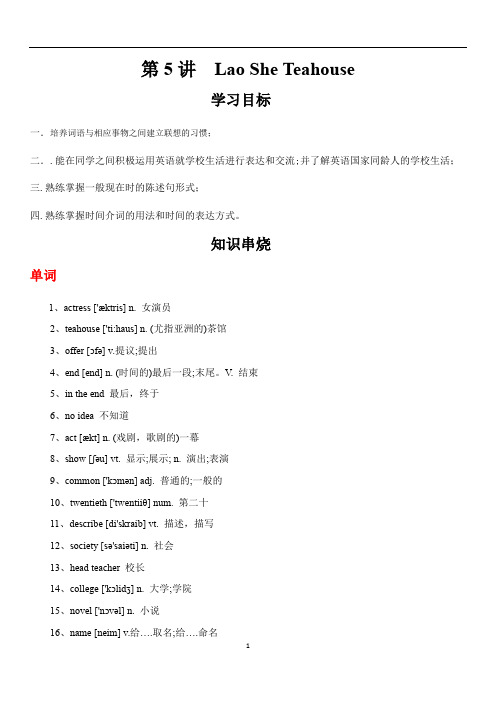
第5讲Lao She Teahouse学习目标一.培养词语与相应事物之间建立联想的习惯;二..能在同学之间积极运用英语就学校生活进行表达和交流;并了解英语国家同龄人的学校生活;三.熟练掌握一般现在时的陈述句形式;四.熟练掌握时间介词的用法和时间的表达方式。
知识串烧单词1、actress ['æktris] n. 女演员2、teahouse ['ti:haus] n. (尤指亚洲的)茶馆3、offer [ɔfə] v.提议;提出4、end [end] n. (时间的)最后一段;末尾。
V. 结束5、in the end 最后,终于6、no idea 不知道7、act [ækt] n. (戏剧,歌剧的)一幕8、show [ʃəu] vt. 显示;展示; n. 演出;表演9、common ['kɔmən] adj. 普通的;一般的10、twentieth ['twentiiθ] num. 第二十11、describe [di'skraib] vt. 描述,描写12、society [sə'saiəti] n. 社会13、head teacher 校长14、college ['kɔlidʒ] n. 大学;学院15、novel ['nɔvəl] n. 小说16、name [neim] v.给….取名;给….命名17、if [if] conj. (表条件)如果;若18、magic ['mædʒik] adj.魔术的;戏法的课文Unit1I wanted to see the Beijing Opera.Betty:Lingling and I went to Lao She Teahouse last night.Tony:How was it?Betty:It was great!You know,I wanted to see Beijing Opera,so Lingling offered to take me there.We dran k tea and watched an opera.Tony:Did you understand the opera?Betty:No,it was difficult to understand the words.But the actors and actress were excellent.Tony:How long did you stay?Betty:We only planned to watch for an hour,but in the end,we stayed for three hours.Tony:Did you enjoyed it?Betty:Well,it was interesting---that’s the main thing.I hope to understand more next time.Tony:Do you often go to see Beijing Opera,Lingling?Lingling:No,I don’t.I wanted to take Betty to the teahouse because it’s famous.Tony:Who is Lao She?Betty:No idea.Ask Lingling.Lingling:Lao She is a great writer.He’s especially famous for his play Teahouse.Unit2It describes the changes in Chinese societyRead the passage and match the heading with the paragraphs.a)Lao She Teahouseb)The Story of Teahousec)Lao She1Teahouse is one of Lao She’s most famous plays.He wrote it in1957.The play has three acts and show s the lives of common people in China from the end of the nineteenth century to the middle of twentieth cent ury.It tells us the story of Wang Lifa and the customers of his teahouse in Beijing.It describes the changes i n Chinese society over fifty years around the beginning of the twentieth century.2Lao She was born in Beijing in1899.His mother sent him to a teacher’s school in1913.After finishing school in1918,he became a head teacher of a primary school.In1924Lao She left home and went to Engla nd.He taught Chinese at a college in London and returned to China five years later.He wrote many plays,n ovels and short stories about people’s lives,and was named“the People’s Artist”.Lao She is one of the great est Chinese writers of the twentieth century.3At Lao She Teahouse today,customers can drink tea and eat delicious Beijing food.If you like the Beiji ng Opera,traditional music or magic shows,you can enjoy them at the o She Teahouse gives a warm welcome to everyone from all over the world.语法一、动词不定时作宾语动词不定式做宾语,表明意图、希望或决定的内容。
(完整word版)八年级上册英语外研版(新)各模块知识点归纳总结(全)文档,文档
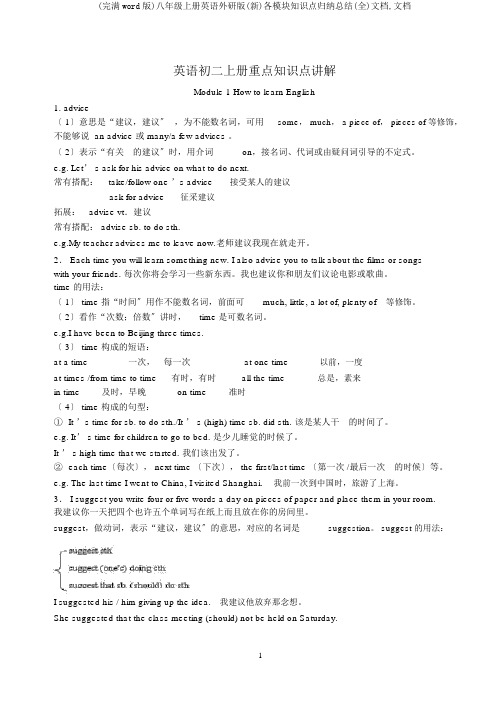
英语初二上册重点知识点讲解Module 1 How to learn English1. advice〔 1〕意思是“建议,建议〞,为不能数名词,可用some, much, a piece of, pieces of 等修饰,不能够说 an advice 或 many/a few advices 。
〔 2〕表示“有关的建议〞时,用介词on,接名词、代词或由疑问词引导的不定式。
e.g. Let’ s ask for his advice on what to do next.常有搭配:take/follow one ’s advice接受某人的建议ask for advice征采建议拓展:advise vt.建议常有搭配: advise sb. to do sth.e.g.My teacher advises me to leave now.老师建议我现在就走开。
2. Each time you will learn something new. I also advise you to talk about the films or songswith your friends. 每次你将会学习一些新东西。
我也建议你和朋友们议论电影或歌曲。
time 的用法:〔 1〕 time 指“时间〞用作不能数名词,前面可much, little, a lot of, plenty of等修饰。
〔 2〕看作“次数;倍数〞讲时,time 是可数名词。
e.g.I have been to Beijing three times.〔 3〕 time 构成的短语:at a time一次,每一次at one time以前,一度at times /from time to time有时,有时all the time总是,素来in time及时,早晚on time准时〔 4〕 time 构成的句型:①It ’s time for sb. to do sth./It ’ s (high) time sb. did sth. 该是某人干的时间了。
八年级英语上册Module5LaoShe'sTeahouse知识点归纳总结新版外研版2018072428-英语备课大师【全免费】
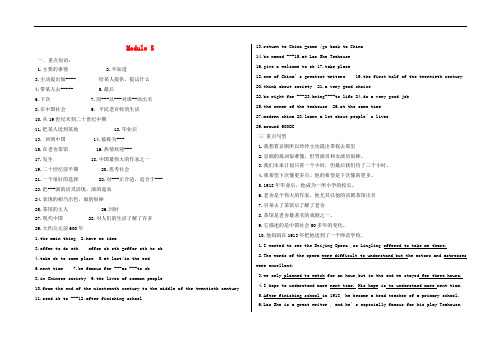
Module 5一.重点短语:1.主要的事情2.不知道3.主动提出做---- 给某人提供、提议什么4.带某人去-----5.最后6.下次7.因---以---对谁--而出名8.在中国社会 9. 平民老百姓的生活10.从19世纪末到二十世纪中期11.把某人送到某地 12.毕业后13. 回到中国 14.被称为---15.在老舍茶馆 16.热情欢迎---17.发生 18.中国最伟大的作家之一19.二十世纪前半期 20.思考社会21.一个很好的选择 22.对---正合适,适合于---23.把---演的活灵活现,演的逼真24.表现的相当出色,做的很棒25.茶馆的主人 26.同时27.现代中国 28.对人们的生活了解了许多29.大约公元前600年1.the main thing2.have no idea3.offer to do sth offer sb sth =offer sth to sb4.take sb to some place5.at last/in the end6.next time7.be famous for ---as ---to sb8.in Chinese society 9.the lives of common people10.from the end of the nineteenth century to the middle of the twentieth century11.send sb to ---12.after finishing school 13.return to China =come /go back to China14.be named ---15.at Lao She Teahouse16.give a welcome to sb 17.take place18.one of China’s greatest writers 19.the first half of the twentieth century 20.think about society 21.a very good choice22.be right for ---23.bring----to life 24.do a very good job25.the owner of the teahouse 26.at the same time27.modern china 28.learn a lot about people’s lives29.around 600BC三重点句型1.我想看京剧所以玲玲主动提出带我去那里2.京剧的戏词很难懂,但男演员和女演员很棒。
外研版英语八年级上册Module5 单元必考知识点
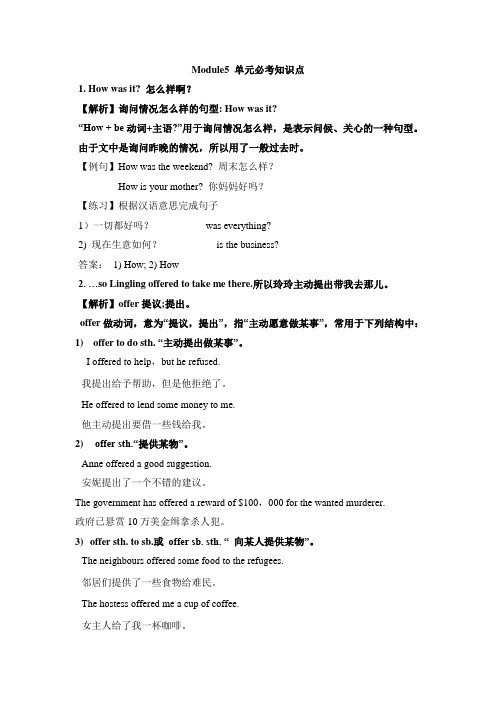
Module5 单元必考知识点1. How was it? 怎么样啊?【解析】询问情况怎么样的句型: How was it?“How + be动词+主语?”用于询问情况怎么样,是表示问候、关心的一种句型。
由于文中是询问昨晚的情况,所以用了一般过去时。
【例句】How was the weekend? 周末怎么样?How is your mother? 你妈妈好吗?【练习】根据汉语意思完成句子1)一切都好吗?_________ was everything?2) 现在生意如何?_________ is the business?答案:1) How; 2) How2. …so Lingling offered to take me there.所以玲玲主动提出带我去那儿。
【解析】offer提议;提出。
offer做动词,意为“提议,提出”,指“主动愿意做某事”,常用于下列结构中:1)offer to do sth. “主动提出做某事”。
I offered to help,but he refused.我提出给予帮助,但是他拒绝了。
He offered to lend some money to me.他主动提出要借一些钱给我。
2)offer sth.“提供某物”。
Anne offered a good suggestion.安妮提出了一个不错的建议。
The government has offered a reward of $100,000 for the wanted murderer.政府已悬赏10万美金缉拿杀人犯。
3)offer sth. to sb.或offer sb. sth. “ 向某人提供某物”。
The neighbours offered some food to the refugees.邻居们提供了一些食物给难民。
The hostess offered me a cup of coffee.女主人给了我一杯咖啡。
Module5+Lao+She+Teahouse+知识点讲解语法讲解总结归纳 外研版英语八年级上册

Module 5 Lao She TeahouseUnit 1 I wanted to see the Beijing Opera.知识讲解知识点1. offer /'ɒfə/ v.提议;提出考向【重点】offer sth.提供某物She offered a book. 她提供了一本书。
offer sb.sth. /offer sth. to sb.(主动)给某人提供某物He offered me an apple/offered anapple to me.他主动给了我一个苹果。
offer to do sth. (主动)提出做某事Lingling offered to drive me home.玲玲主动提出开车送我回家。
典例 A lot of heroes ________ their lives ________ our country during the earthquake in Sichuan.A.offer;to B.offer;for C.offered;to D.offered;/【点拨】句意为“在四川地震中,许多英雄为我们国家奉献了生命。
”知识点2. actor/ˈæktə(r)/n.演员(尤指男演员) ,actress则常指女演员。
eg:The young actor pretended to be Hamlet.那个年轻演员佯装成哈姆雷特。
拓展表示男女不同的名词初中阶段有:男a ctor waiter host salesman conductor spokesman女a ctress W aitress hostess saleswoman conductress spokeswoman 规律一般“女”的后缀是:woman,ess;“ 男”的后缀一般是:man等。
魔法记忆:售票员班长(照)镜子,访问教授(找)医生。
按:有些同学常把or 结尾的词误拼为er 结尾的词。
初二英语上册(外研版)Module5 重点知识点

Module5 Lao She TeahouseUnit 1 I wanted to see the Beijing Opera.一.重点单词1. actress n. 女演员→(对应词)actor n. 男演员2. teahouse n. (尤指亚洲的)茶馆3. offer v. 提议;提出4. end n. (时间的)最后一段,末尾v. 结束二.重点短语1. how long 多久2. in the end 最后;终于3. no idea 不知道4. be famous for 因……而著名5. would like 想要6. offer to do sth. 主动提出做某事7. hope to do sth. 希望做某事三.重点语法1.offer的用法①offer sth. 提供某物例:She offered a book. 她提供了一本书。
①offer sb. sth. /offer sth. to sb. (主动)给某人提供某物例:He offered me an apple/offered an apple to me.他主动给了我一个苹果。
①offer to do sth. (主动)提出做某事例:Lingling offered to drive me home.玲玲主动提出开车送我回家。
2.in the end的用法in the end的意思是“最后”= finally = at last例:In the end,we got to the small village.最后,我们到达了那个小山村。
3.以下句子是含有动词不定式的句子I wanted to see the Beijing Opera, so Lingling offered to take me there.No, it was difficult to understand the words.We only planned to watch for an hour.I hope to understand more next time.Do you often go to see the Beijing Opera, Lingling?I wanted to take Betty to the teahouse because it’s famous.(1)动词不定式的形式动词不定式的基本形式是“to+动词原形”,常写作to do(有时to可以省略),否定形式为not to do。
Module 5 重要知识点讲解2021-2022学年外研版八年级英语上册

Module 5 Lao She Teahouse重要知识点讲解Unit 1一、询问对方对某事物的看法的表达-How was it?怎么样?-It was great.非常的好。
[点拨]"How was sth?"用于询问对方对某事物的看法。
该问句回答:It was+adj.二、interest一词Well,it was interesting.-that's the main thing.它很有意思,那才是关键。
[点拨]interest 作名词时,意为“兴趣,趣味”。
take (an) interest in... 对...发生兴趣places of great interest 名胜interested 意为“感兴趣的”,用来修饰人,一般不单独使用,常用于短语。
be interested in “对...感兴趣”。
I'm interested in English.我对英语感兴趣。
interesting意为“有趣的”,用来修饰物,在句子中可以作表语,亦可作定语。
This is an interesting book.这是一本有趣的书。
三、重点短语表达want to do 想做...decide to do 决定做...offer to do 主动提出做...it is difficult to do 做...是困难的plan to do 计划做...hope to do 希望做...go to do 去做...try to understand 尽力想听懂have some tea 喝些茶have a good time 玩得开心that's the main thing 最主要的兴趣/东西no idea 不知道next time 下次be famous for 以...而闻名be famous as 作为...而闻名be famous to 为某人所熟知Unit 2一、表示世纪的不同时期的常用介词短语表达[点拨]century n. 世纪,常用表达:...世纪the …th century...世纪初at the beginnning of the...th century...世纪中叶in the middle of the ...th century...世纪末at the end of the …th century世纪之交 at the turn of the century二、动词不定式(1)[点拨]动词不定式是由“to + 动词原形”构成(有时可以不带to),否定形式是“not +动词不定式” 。
最新外研版英语8年级上Module 5 知识点清单笔记)

Module 5单词讲解1. actress n. 女演员—actor 男演员动词:act 表演; 行动e.g. Jackie Chan is a famous actor.Do you know many actresses?actor —actresswaiter —waitresshost —hostess2. teahouse 茶馆at the teahouse 在茶馆3. offer v. 提供;主动提出词组:offer sb. sth. =offer sth. to sb. 给某人提供某物e.g. He offered me a book. =He offered a book to me.offer to do sth. 主动提出做某事e.g. Lingling offered to drive me homeoffer n. 提议;(短期)减价特价;录取通知书43.【2014河南】—You may go to Milan for a free trip.—It’s a very kind _______, but I really can’t accept it.A. excuseB. offerC. promiseD. decision44.(2015湖北武汉)—Any special ________ in this shopping mall now?—Sure, we have the latest e-products on sale.A. offerB. priceC. brandD. service4. end n. (时间的)最后一段;末尾v. 结束in the end 最后=at last =finallye.g. In the end they passed the exam.at the end of + 时间/地点在…尽头/末端e.g. There is a shop at the end of the street.at the end of last termby the end of 到…为止【过去完成时had done】e.g. We had learnt about 1000 words by the end of last term.5. no idea 不知道I have no idea. 我不知道=I don’t know.—Do you know what time the last train is? —No idea.6. show v. 展示,展出n. 演出,表演词组:show sb. sth. =show sth. to sb. 出示/给某人看某物e.g. Can you show me your picture? 你可以把你的照片给我看看嘛?=Can you show your picture to me?show sb. around sp. =take sb. around sp. 领某人参观某地e.g. I will show you around my factory. 我将领你参观我的工厂be on show 展览e.g. There is a flower show in the park.7. common n. adj. 普通的,一般的common life 普通的生活8. 基变序,有规律,词尾加上th一二三,特殊记,单词td作结尾first , second, third八减t, 九去e, f来把ve替eighth ninth fifth twelfth单词ty作结尾,一定把y变ie twenty—twentieth若是碰到几十几,只变个位就可以thirty-five —thirty-fifty四,十四,四十four —fourth fourteen—fourteenth forty—fortieth九,十九,九十nine—ninth nineteen—nineteenth ninety —ninetieth 9. describe v. 描述—description n. 描写【书写】词组:decribe… as 把……描述为e.g. They describe a language as a system.10. society n. 社会in Chinese society 在中国社会11. college n. 大学go to college 上大学12. name n. 名字name v. 给…命名给……取名e.g. He named his son Tom.※名词named/called 一个被叫做……a place named Daqing a girl called Alice13. if 如果,若;是否如果(条件状语从句)—主将从现是否(宾语从句)I don’t know if it will rain tomorrow.—What are you doing tomorrow, Jane?—I’ll go bike riding if it ______. I like riding on rainy days. 【2013丹东】A. doesn’t rain B is cloudy C. is snowy D. rains答案:D课文讲解:Unit 11. see the traditional Beijing Opera 看京剧watch an opera 看戏剧2. The opera is difficult to understand. 戏剧很难理解。
- 1、下载文档前请自行甄别文档内容的完整性,平台不提供额外的编辑、内容补充、找答案等附加服务。
- 2、"仅部分预览"的文档,不可在线预览部分如存在完整性等问题,可反馈申请退款(可完整预览的文档不适用该条件!)。
- 3、如文档侵犯您的权益,请联系客服反馈,我们会尽快为您处理(人工客服工作时间:9:00-18:30)。
Module 5
一.重点短语:
1.主要的事情
2.不知道
3.主动提出做---- 给某人提供、提议什么
4.带某人去-----
5.最后
6.下次
7.因---以---对谁--而出名
8.在中国社会9. 平民老百姓的生活
10.从19世纪末到二十世纪中期
11.把某人送到某地12.毕业后
13. 回到中国14.被称为---
15.在老舍茶馆16.热情欢迎---
17.发生18.中国最伟大的作家之一
19.二十世纪前半期20.思考社会
21.一个很好的选择22.对---正合适,适合于---
23.把---演的活灵活现,演的逼真
24.表现的相当出色,做的很棒
25.茶馆的主人26.同时
27.现代中国28.对人们的生活了解了许多
29.大约公元前600年
1.the main thing
2.have no idea
3.offer to do sth offer sb sth =offer sth to sb
4.take sb to some place
5.at last/in the end
6.next time
7.be famous for ---as ---to sb
8.in Chinese society 9.the lives of common people
10.from the end of the nineteenth century to the middle of the twentieth century
11.send sb to ---12.after finishing school
13.return to China =come /go back to China
14.be named ---15.at Lao She Teahouse 16.give a welcome to sb 17.take place
18.one of China’s greatest writers 19.the first half of the twentieth century
20.think about society 21.a very good choice
22.be right for ---23.bring----to life 24.do a very good job
25.the owner of the teahouse 26.at the same time
27.modern china 28.learn a lot about people’s lives
29.around 600BC
三重点句型
1.我想看京剧所以玲玲主动提出带我去那里
2.京剧的戏词很难懂,但男演员和女演员很棒。
3.我们本来计划只看一个小时,但最后我们待了三个小时。
4.我希望下次懂更多点。
他的希望是下次懂的更多。
5.1918年毕业后,他成为一所小学的校长。
6.老舍是个伟大的作家,他尤其以他的话剧茶馆出名
7.贝蒂去了茶馆后了解了老舍
8.茶馆是老舍最著名的戏剧之一。
9.它描述的是中国社会50多年的变化。
10.他妈妈在1913年把他送到了一个师范学校。
1.I wanted to see the Beijing Opera ,so Lingling offered to take me there.
2.The words of the opera were difficult to understand,but the actors and actresses were excellent.
3.we only planned to watch for an hour,but in the end we stayed for three hours.
4.I hope to understand more next time. His hope is to understand more next time.
5.After finishing school in 1918, he became a head teacher of a primary school.
o She is a great writer , and he’s especially famous for his play Teahouse.
7.Betty knew about Lao She after she went to the teahouse/after going to the teahouse.
8.Teahouse is one of Lao She’s most famous plays.
9.It describes the changes in Chinese society over fifty years.
10.His mother sent him to a teacher’s school in 1913.
11.大家很容易理解这个故事和看到中国社会的变化
12.他在伦敦的一所大学里教汉语并且在五年后回到了中国。
13.他写了许多关于人民生活的戏剧,小说,短故事,被称为“人民艺术家”
14.老舍是20世纪最伟大的作家之一。
15.在今天的老舍茶馆,顾客可以边喝茶边吃可口的北京食品。
16.如果你喜欢传统音乐和魔术表演,你可以在茶馆欣赏它们。
17.老舍茶馆热情欢迎来自世界各地的每一个人。
18.鲁迅希望帮助中国人民变得健康和强壮。
19.所以他决定成为一个医生。
20.几年后,他开始写短篇小说,因为他想教人们了解社会
11.It’s easy for everyone to understand the story and see the changes in Chinese society.
12.He taught Chinese at a college in London and returned to China five years later.
13.He wrote many plays ,novels and short stories about people’s lives, and was named “the People’s Artist”.
o She is one of the greatest Chinese writers of the twentieth century.
15.At Lao She Teahouse today, customers can drink tea and eat delicious Beijing food.
16.If you like the Beijing Opea, traditional music or magic shows, you can enjoy them at the teahouse.
o She Teahouse gives a warm welcome to everyone from all over the world.
18.LuXun hoped to help the Chinese people become healthy and strong.
19.So he decided to be /become a doctor.
20.After a few years/ A few years later, he began/started to write short stories, because he wanted to teach people about society.
21.它描述的是阿Q的艰辛生活并且使人们对社会进行思考。
22.在二十世纪二十年代,人们开始把他的作品翻译成英语。
23.本年度的学校戏剧是个很好的选择。
24.对于约100年前中国人民的生活我们了解了很多。
25.男女演员们都表现得相当出色。
26.李楠,那个扮演王立发的学生,是最出色的。
27.他把从青年到老年的王立发演的活灵活现。
21.It describes the hard life of Ah Q and makes people think about society.
22.In the 1920s, people began to translate his works into English.
23.This year’s school play was a very good choice.
24.We learnt a lot about people’s lives in China some /about/aroundone hundred years ago.
25.The actors and actresses all did a very good job.
26.Li Nan . the student playing Wang Lifa, was the best.
27.He brought Wang Lifa to life, from young man to an old man.。
